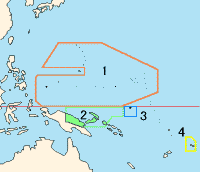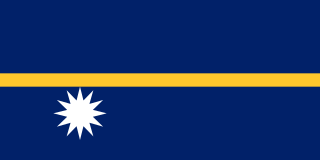
Nauru, officially the Republic of Nauru and formerly known as Pleasant Island, is an island country and microstate in Micronesia, part of Oceania in the Central Pacific. Its nearest neighbour is Banaba of Kiribati, about 300 km (190 mi) to the east.

The history of human activity in Nauru, an island country in the Pacific Ocean, began roughly 3,000 years ago when clans settled the island.

The politics of Nauru take place in a framework of a parliamentary representative democratic republic, whereby the President of Nauru is the head of government of the executive branch. Legislative power is vested in both the government and the parliament. The Judiciary is independent of the executive and the legislature.

Bernard Annen Auwen Dowiyogo was a Nauruan politician who served as President of Nauru on seven separate occasions. During this time, he also served as a Member of Parliament for the constituency of Ubenide.
An administrator in the constitutional practice of some countries in the Commonwealth is a person who fulfils a role similar to that of a governor or a governor-general.
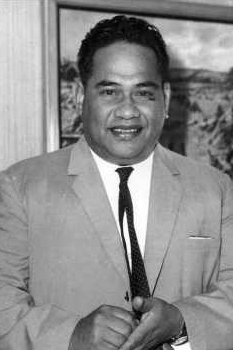
Hammer DeRoburt was the first President of the Republic of Nauru, and ruled the country for most of its first twenty years of independence.

Nauru, following independence from the United Kingdom, became a sovereign, independent republic on 31 January 1968. Nauru has established diplomatic relations with a number of nations, including most of its Pacific neighbors with which it maintains economic, cultural and administrative ties.

The president of Nauru is elected by Parliament from among its members, and is both the head of state and the head of government of Nauru. Nauru's unicameral Parliament has 19 members, with an electoral term of three years. Political parties only play a minor role in Nauru politics, and there have often been periods of instability in the Presidential office. Shifting allegiances among a small number of individuals can lead to frequent changes in the makeup of the government of the day, including the presidential position itself.
Lagumot Gagiemem Nimidere Harris was a political figure from the Pacific nation of the Republic of Nauru, and served as its President. He was a cousin of René Harris.
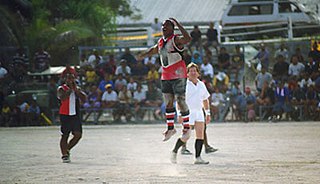
Australian rules football in Nauru dates back to the 1910s. Australian rules football became the national sport of Nauru after its independence in 1968. Today, its national participation rate is over 30%, the highest in the world.

The Parliament of Nauru has 19 members, elected for a three-year term in multi-seat constituencies. The President of Nauru is elected by the members of the Parliament. The number of seats was increased to 19 following elections in 2013.

Nauruan nationality law is regulated by the 1968 Constitution of Nauru, as amended; the Naoero Citizenship Act of 2017, and its revisions; custom; and international agreements entered into by the Nauruan government. These laws determine who is, or is eligible to be, a national of Nauru. The legal means to acquire nationality, formal membership in a nation, differ from the domestic relationship of rights and obligations between a national and the nation, known as citizenship. Nauruan nationality is typically obtained either on the principle of jus soli, i.e. by birth in the Nauru or under the rules of jus sanguinis, i.e. by birth to parents with Nauruan nationality. Naturalization is only available to those with some connection to the country, such as the spouse of a citizen; no amount of time living in Nauru will, by itself, make one eligible for naturalization.
The Nauru Phosphate Royalties Trust (NPRT) was a sovereign wealth fund developed by the government of the Republic of Nauru in which the government invested money from the state-owned mining company, Nauru Phosphate Corporation. This money was then re-invested in a real estate portfolio, among other things, to provide the government with a reliable national income following the depletion of minable phosphates on the island. Although at one time successful, mismanagement and corruption later essentially bankrupted the fund, thus virtually bankrupting the entire Republic.
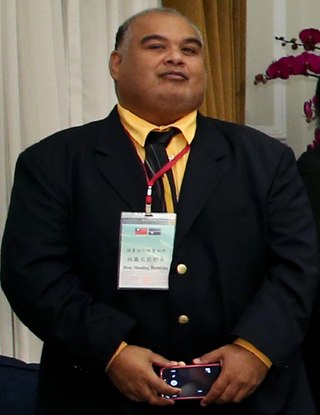
Shadlog Armait Bernicke is a Nauruan politician representing the Buada constituency in the Parliament of Nauru.

Elections for the Legislative Council for the Territory of Nauru were held for the first and only time on 22 January 1966.

Austin Bernicke was a Nauruan politician. He was a member of the first Local Government Council in 1951, then a member of Parliament after it was established in 1966, serving until his death in 1977. He also served as a cabinet minister from 1968 until 1976.

James Ategan Bop was a Nauruan politician. He served as a member of Parliament and its predecessors from 1951 to 1955 and then from 1959 until his death, and was Minister of Finance for most of the period between 1968 and 1978.

Ludwig Dowong Keke is a Nauruan politician, diplomat, and dentist. Keke was Nauru's first university graduate. He worked as a dentist in Australia before returning to Nauru to enter politics by 1967, first being elected to the Constitutional Convention, and then to the Legislative Assembly. He served in the parliament until 1972. After 1977, he served as a dental officer in Western Australia. He then served as a dental officer for the South Pacific Commission in 1981. He returned to Nauru and served three terms in the parliament between 1986 and 2000, serving as speaker of parliament in his final term. By 2004, he was a diplomat to Fiji, and in 2007 he became the first Nauruan ambassador to Taiwan. He served in that capacity until 2016.
Samuel Edwin Tsitsi was a Nauruan politician.
Roy Demanganuwe Degoregore was a Nauruan politician.


